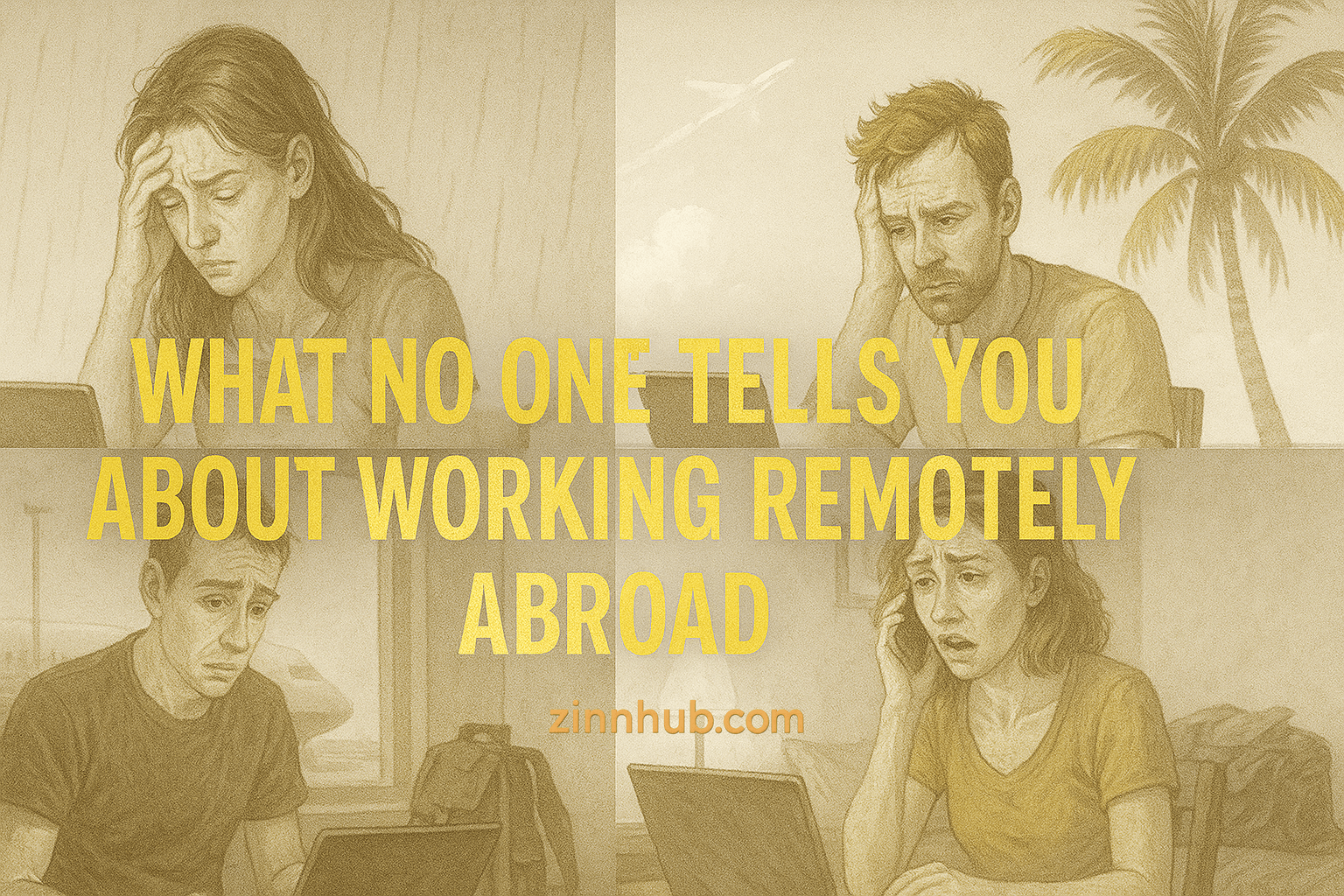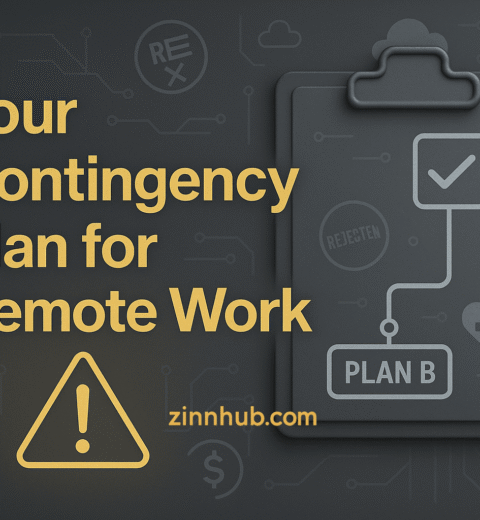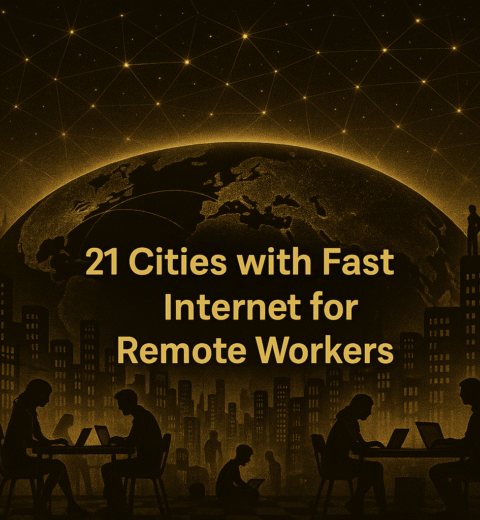Table of Contents
- ⚠️ 1. The Visa & Legal Grey Area (Isn’t So Grey After All)
- ⏰ 2. Time Zones Can Ruin Your Productivity (If You Let Them)
- 🌐 3. Wi-Fi Isn’t Always Reliable (Or Safe)
- 💳 4. Getting Paid Is a Nightmare Without Planning
- 🧠 5. Mental Health & Loneliness Are Very Real Abroad
- 💸 6. Your Cost of Living Might Not Be What You Expect
- 🛠️ 7. Tools & Tactics for Remote Work Survival
- 🆘 Emergency Planning While Abroad
- 🏠 When to Return Home (And Why It’s Not Failure)
- 🧰 ZinnHub Insider Section: Thriving Abroad as a Zinner
- ✅ Conclusion: Dream Big, Prepare Bigger
A practical survival guide for digital nomads, freelancers, and remote workers powered by ZinnHub
To most freelancers, working remotely from a café in Spain or a beach in Bali sounds like the dream. And sometimes, it really is! But it’s also full of unexpected stuff no one talks about until you’re already dealing with it. This guide cuts through the fluff and tells it like it is – the stuff you won’t find on those overly filtered Instagram reels.
I’m not writing this as an outsider looking in; I’ve worked remotely across multiple countries over the years. From getting hit with surprise tax bills to nearly missing a flight because I didn’t read a visa properly, ending up in a city during a national holiday with nowhere open and no cash, and getting completely flooded out of an apartment during monsoon season (to name a few mishaps!) – I’ve seen the best and worst of this remote work lifestyle. This blog is my way of sharing what I’ve learnt the hard way, so hopefully you don’t have to.
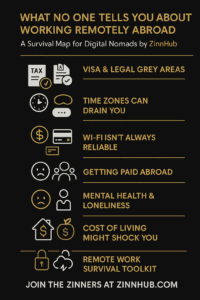
⚠️ 1. The Visa & Legal Grey Area (Isn’t So Grey After All)
Tax Implications:
Being abroad doesn’t magically cancel your tax responsibilities. A lot of countries have tax treaties, sure – but that doesn’t mean you’re off the hook. You might still owe money back home. Best move? Chat with someone who knows the ropes when it comes to freelancer taxes and global rules.
Proof of Funds Requirements:
Most digital nomad visas aren’t just asking if you can work remotely – they want to know you can support yourself while doing it. That usually means showing proof of a steady income, often between £2,000 and £5,000 per month. Some countries ask for even more if you’re bringing a partner or kids.
Be ready to provide recent bank statements, payslips, or even client contracts. It’s not just a checkbox – officials will actually look at your finances. Get your documents in order early so you’re not scrambling later.
Length of Stay Limitations:
Even if you’ve jumped through all the hoops and got the right visa, it usually doesn’t mean “stay as long as you like”. Most digital nomad visas cap your stay at somewhere between 6 and 12 months – and once that clock runs out, you’ll need to move on or apply for a renewal.
But here’s the thing: renewals aren’t always guaranteed. Rules can change, processing times can drag on, and some countries don’t offer a clear path to extend at all. If you’re planning to stay longer, always have a backup country in mind – and don’t leave your paperwork to the last minute.
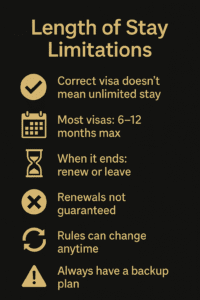
Apostilles & Document Translations:
Some countries are serious sticklers when it comes to paperwork – and not just any paperwork. You might be asked to provide legalised versions of things like birth certificates, university degrees, or police clearances, sometimes with an official apostille stamp from your home country. And if that wasn’t enough, you’ll often need them translated by a certified professional into the local language.
It’s tedious, but important. Missing a stamp or using the wrong kind of translation can get your visa application delayed or rejected altogether. Get a head start on this early – it’s rarely fast, and almost never cheap.
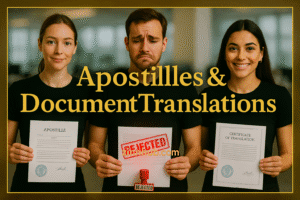
Remote Work Visa Options (More Complex Than You Think):
In 2025, over 60 countries have digital nomad visa options. Sounds great – but they’re far from equal.
Here are a few popular options:
- Portugal – €3,480/month income and €10,440 in savings. Not exactly backpacker budget territory.
- Spain – Needs proof of €2,763/month. Add more if you’re bringing family.
- Croatia – €3,295/month or a sizeable chunk of savings.
- Costa Rica – $3,000/month (solo) or $5,000 (if you’ve got dependants).
- Thailand – You’ll need to show at least $14,400 saved up.
- Dubai – $5,000/month, plus proof you’ve been running a company for at least a year.
What they don’t always mention:
- These applications take time.
- Some have high fees or hidden costs.
- If you’re travelling with family, your income requirement shoots up.
💡 ZinnHub Tip: Don’t go it alone. Our community forums and visa-savvy members can help you sort out what works – and what’s a bureaucratic nightmare.
⏰ 2. Time Zones Can Ruin Your Productivity (If You Let Them)
Time Zone Fatigue:
Recalculating time zones every day for calls, meetings, or deadlines? Yeah, it gets old fast – and mentally exhausting. But it’s not just your calendar that suffers. Your body clock can get completely out of sync, especially if you’re staying up late for calls or waking at odd hours to match someone else’s schedule. Poor sleep, inconsistent routines, and constantly adjusting your internal rhythm can all take a toll.

Calendar Blocking:
When you’re working across time zones, your day can easily get hijacked by other people’s schedules – meetings at midnight, calls first thing in the morning, random pings in the middle of dinner. It’s a fast way to lose any sense of routine.
That’s why it’s important to block out fixed hours for deep work – time that’s just for you, no matter what time zone you’re in. Whether you’re in Bogotá or Bangkok, protect that space. It keeps your productivity (and sanity) intact.
Batch Communication (Stop the Constant Interruptions):
You know that feeling when you’re constantly replying to messages, hopping on random calls, and by the end of the day… nothing’s actually finished? It’s brutal. One of the easiest fixes I’ve found is this: block out a couple of set times each day to deal with batch communication. Emails, chats, meetings – all in one go. The rest of the time? Head down, no interruptions. It’s not perfect, but it helps you stay in control and way less fried.

Tools That Help:
Timezone.io, World Time Buddy – super helpful if you’re juggling clients or team members across five continents.
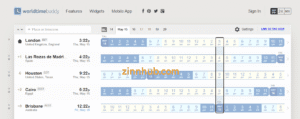
🌐 3. Wi-Fi Isn’t Always Reliable (Or Safe)
Public Wi-Fi Risks:
Yeah, free Wi-Fi at a café abroad feels like a win – but it can be a trap. Most public networks aren’t secure, which means anyone nearby with the right tools can snoop on what you’re doing. I’ve seen people log into their bank or work accounts on open Wi-Fi without realising they’re basically broadcasting it. A VPN keeps your connection private. It’s not about Netflix – it’s about not handing your data to random strangers.
Coworking Day Pass vs. Membership:
If you’re only in town for a couple of days, a day pass is fine. You’ll get a desk, some decent Wi-Fi, and maybe a free coffee. But if you’re planning to stay a bit longer – even just a week – a membership often works out cheaper and comes with extras like lockers, phone booths, quiet zones, or access to events and meetups. Also, memberships help you build a routine. You start seeing the same faces, finding your spot, settling into a rhythm. That can be huge when everything else around you is unfamiliar.
Offline Work:
Don’t wait until the Wi-Fi dies to realise you’ve got nothing you can do. Have a backup set of tasks that don’t require a strong connection or fast internet – drafts to write, files to organise, designs to sketch, invoices to prep, or even content ideas to brainstorm. Download key docs in advance, and keep things synced locally where you can. Because when the power cuts out midday in a tropical storm – and it will – you’ll be glad you came prepared. Be prepared next time the power cuts out!
Different Coworking Cultures:
Some coworking spaces are pin-drop silent and feel like libraries. Others feel like bars with laptops. Then you get what feels like a uni common room with a DJ in the corner. You’ll come across places full of heads-down coders, chatty startup crews, digital nomads on their fifth coffee, or folks networking like it’s speed dating. You’re not just renting a desk – you’re stepping into a micro-community, and not all of them will suit how you like to work. The vibe really matters, so test before you commit.

Recommended Internet Speeds:
- Writing/admin: 5–10 Mbps
- Video calls: 10–20 Mbps
- File-heavy creative work: 25+ Mbps
💳 4. Getting Paid Is a Nightmare Without Planning
Withholding Services:
Working with clients in different countries can get messy fast – especially when tax laws, payment rules, and contractor obligations vary wildly. That’s where specialised platforms come in. Platforms like Deel or Remote help manage international tax compliance. Worth the investment if you’re juggling global clients. They can automatically handle things like local withholding requirements, country-specific contracts, and even generate payslips for you and your clients. They’re not just helpful – they’re peace of mind when you’re trying to keep things legal across borders.
Exchange Rates:
Exchange rates can feel harmless – until they quietly drain chunks of your income. One week you’re fine, the next, a slight dip and suddenly you’re getting paid less for the same work. It adds up, especially if you’re bouncing between currencies. Multi-currency accounts like Wise or Revolut can help smooth it out. They let you hold, send, and convert money when the rates make sense – not just when the invoice lands.
Check live exchange rates with XE Currency ConverterBank Account Limits:
Opening a local bank account to receive payment can be tricky – or flat-out impossible – unless you’re officially a resident. Even with a visa, many banks ask for proof of long-term address, utility bills in your name, or local tax numbers. Some even require an in-person appointment… and good luck getting one if you don’t speak the language. If you plan to stay somewhere for a while, research banking options in advance – and have a fallback, like Wise or Payoneer, just in case.
Documentation:
Paperwork might seem like a small thing – until it blocks access to your money. Most banks want proof of address, utility bills, and sometimes even lease agreements – and they’re not always flexible. Digital statements? Often not accepted. A friend’s address? Usually a no-go. Some banks even want original paper documents, which can be a nightmare if you’re moving around. The earlier you get your paperwork sorted, the less likely you’ll be stuck chasing down forms in a new country.
🧠 5. Mental Health & Loneliness Are Very Real Abroad
Digital Nomad Groups:
Feeling isolated? You’re not alone. Try platforms like Nomads.com (formally Nomad List) or hop into a ZinnHub thread to see who’s nearby. You’ll be surprised how quickly things shift when you meet a few like-minded people. Whether it’s a coworking buddy, a local WhatsApp group, or someone to grab a coffee with, a bit of connection goes a long way when you’re far from home. The first step is reaching out – most nomads are more welcoming than you’d think.
Co-living Options:
Outsite.co, or coliving.com and other co-living spaces make it easier to meet like-minded people, especially if you’re starting from scratch. You get more than just a bed – you get built-in community, shared routines, and often events that make settling in a lot less awkward. It’s a great middle ground if you’re not ready to commit to a long-term rental but still want something more stable (and social) than a hostel or Airbnb. It can turn a lonely landing into an instant network.
Isolation:
The more you move, the harder it can get. Culture shock, language barriers, and lack of routine sneak up on you fast. One minute you’re riding the high of a new place, and the next, you’re feeling weirdly out of sync with everything around you. Even simple things – ordering food, finding a pharmacy, or not hearing your native language all day – can wear you down. It doesn’t mean you’re failing. It just means you’re human.

Stay Connected:
Sometimes a quick video call, a shared playlist, or even just a voice note over the weekend is enough to remind you that you’re not drifting out there alone. Staying connected doesn’t have to be some grand effort – it just has to be consistent. Make space for the small stuff: random updates, group chats, bad memes, or checking in with someone who knows your middle name. That regular contact with people back home (or fellow nomads) can be the thing that keeps your head on straight.
💸 6. Your Cost of Living Might Not Be What You Expect
Short-Term Costs:
Flexible living comes at a price – and it adds up fast when you first arrive abroad. Airbnb rentals, for example, often cost double what locals pay (and that’s before you factor in cleaning fees, tourist taxes, and so-called “digital nomad premiums” – the extra cost you often pay for places with fast Wi-Fi, flexible terms, English-speaking landlords, or listings marketed specifically to remote workers). It’s the convenience tax of not committing long-term, and over time, it can quietly eat into your savings.
Healthcare:
Having travel insurance is a good start – but it’s no guarantee of good care. Just because something’s covered doesn’t mean the local clinic is going to meet your expectations. Some places have incredible public health systems, while others rely heavily on private providers that vary wildly in quality and price. Before you need help, take some time to check local reviews, ask in expat forums, and make sure your policy actually covers the clinics or hospitals you’d want to visit. Dig into provider reviews before you need help.

Infrastructure:
It’s easy to forget that local setups aren’t always geared for remote work. That Airbnb might have great views – but no desk, flimsy chairs, and a router older than your laptop. You might end up needing a better router, noise-cancelling headphones, or even a second screen. These kinds of extras aren’t luxury splurges – they’re what help you do your job properly. Over time, they add up – both in cost and in the number of things you’ll wish you packed sooner.
Exit Costs:
People love to talk about how easy it is to pack up and go – but leaving unexpectedly can be expensive. Sudden return flight? Shipping stuff home? Breaking a lease? All pricey. And they always seem to hit at the worst possible time. Even little things, like unused SIM cards, stored gear, or cancelling local subscriptions, can add up. It’s worth having a small “quick get-out fund” set aside – not for adventure, but for those moments when you really need to change plans fast.

Compare First:
Numbeo and Expatistan can help you avoid price-sticker shock when planning your next destination. But don’t just look at rent – check costs for groceries, transport, co-working, gym access, and even coffee. What looks cheap on paper can feel expensive if you’re used to different standards or need extras like fast Wi-Fi or air conditioning. Dig a little deeper, and if you can, ask people currently living there what things actually cost day-to-day. Local knowledge often beats the spreadsheets.
🛠️ 7. Tools & Tactics for Remote Work Survival
VPN & Password Tools:
Don’t skip this. Use a proper VPN and password manager – it’s basic remote work hygiene. Think of it like brushing your teeth – you wouldn’t skip that just because you’re in another country, right? A VPN keeps your data safe on sketchy networks, and a password manager stops you from using “1234” for everything when your brain’s tired from travel. It’s boring, sure. But it’s also the reason your logins – and your client’s data – stay safe.
Time Trackers:
Clients love visibility. Remote monitoring tools like Hubstaff or Time Doctor keep everyone on the same page. That’s great for accountability – but also for you, especially if you’re juggling time zones or switching locations often. These tools help track your own output, not just prove it to someone else. Just don’t let them run your life. Use them as a guide, not a babysitter. It’s about trust – on both ends – and clear expectations go a long way.
If you’re curious about the ethical side of all this, we’ve covered that too in this blog post about tracking remote workers ethically.
Backup Comms:
When Slack or Zoom get blocked (yes, it happens), fall back on WhatsApp, Telegram, or Signal. Some countries restrict certain platforms without notice, and suddenly you’re locked out of calls or client chats mid-project. Having a backup already set up – and letting clients know how to reach you there – saves you from scrambling. Keep a couple of apps installed, tested, and ready to go. It’s not being paranoid – it’s just part of working globally.
Cloud Storage:
Dropbox, Notion, Google Drive – make sure your work is always backed up and accessible. Sounds so obvious, right? But when you’re in a place with sketchy Wi-Fi or your laptop decides to quit on you mid-trip, you’ll be glad everything’s synced somewhere safe. You don’t need anything fancy – just something that lets you grab your files fast, even from your phone. Losing work to a fried drive or stolen bag isn’t just frustrating – it can mess with your income too.
Insurance for Your Tech:
That cracked MacBook will cost twice as much to fix abroad. Get coverage. It’s easy to think you’ll just be careful – until your bag gets knocked over at a bustling café or your phone takes a swim in the wrong sea. Repair costs abroad can be wild, especially for high-end tech. Some travel insurance includes gadget protection, but not all. Double-check the small print, and make sure it actually covers what you use to make a living.
Offline Tools:
Apps like Notion, Obsidian, and Trello – they let you keep working even when the Wi-Fi ghosts you. And trust me, at some point, it will. Maybe the café router dies, or you’re on a train with no signal – either way, having apps that sync later means you don’t waste that time. Plan ahead by downloading your essentials, and test that offline mode actually works before you’re stuck needing it. It’s the kind of prep you’ll only forget once.
🆘 Emergency Planning While Abroad
Unexpected things happen. You don’t want to wing it in a crisis.
- Save local emergency numbers.
- Register with your embassy if you’re staying long-term.
- Give a trusted person back home copies of key documents.
- Store your ID and insurance in secure cloud storage.
- Use apps like SmartTraveler, Sitata or Geosure and Safeture to get alerts.
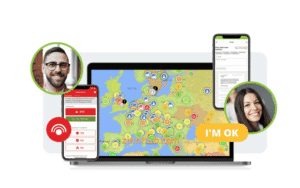
💡 ZinnHub Tip: Our community threads share local alerts, safe zones, and trusted contacts during emergencies.
🏠 When to Return Home (And Why It’s Not Failure)
Sometimes, the most responsible move isn’t to push through – it’s to pause.
Signs It’s Time:
- You’re no longer excited by new places.
- Your budget’s tight, and income feels unpredictable.
- You feel detached – from others and yourself.
- You’re ignoring your health.
- Visa options are getting sketchy.
Reset Without Regret:
- A break can refresh your energy and reset your plans.
- Many remote workers shift to a part-time nomad lifestyle.
- ZinnHub supports you whether you’re remote, rooted, or in-between.
💡 ZinnHub Tip: Don’t compare your path to someone else’s highlight reel. Do what keeps you strong, clear, and creative.
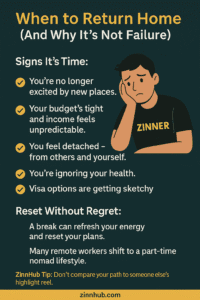
🧰 ZinnHub Insider Section: Thriving Abroad as a Zinner
Connect with Other Zinners:
- Ask what’s working in Chiang Mai, Medellín, or for European digital nomads.
Prep Clients for Remote Work:
- Use ZinnHub’s async guides and timezone templates.
In-Person Help:
- See who’s nearby in our member map. Sometimes coffee beats DMs.
Keep Learning:
- Skill up with mobile-friendly courses built for the freelance life.
✅ Conclusion: Dream Big, Prepare Bigger
Going abroad to work remotely can be one of the most rewarding experiences of your life – but it only works long-term if you go in with your eyes open. Plan, connect, and take care of yourself.
And remember: wherever you work from, you’re not alone.
Ready to go global? Create your Zinner profile and join the community that’s got your back – in every timezone, continent, and contract.

